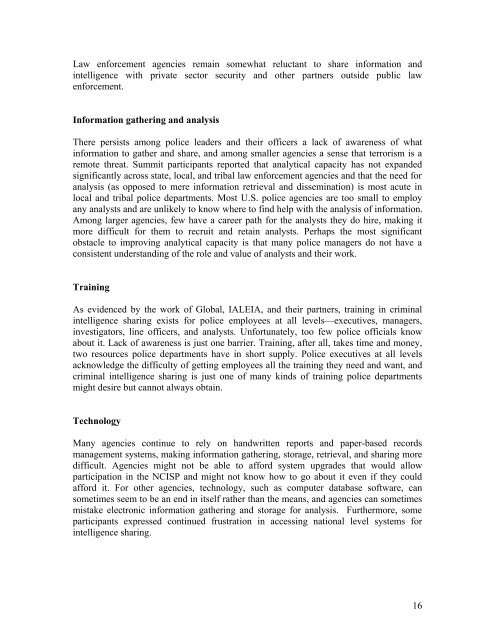National Summit on Intelligence - Federation of American Scientists
National Summit on Intelligence - Federation of American Scientists
National Summit on Intelligence - Federation of American Scientists
Create successful ePaper yourself
Turn your PDF publications into a flip-book with our unique Google optimized e-Paper software.
Law enforcement agencies remain somewhat reluctant to share informati<strong>on</strong> and<br />
intelligence with private sector security and other partners outside public law<br />
enforcement.<br />
Informati<strong>on</strong> gathering and analysis<br />
There persists am<strong>on</strong>g police leaders and their <strong>of</strong>ficers a lack <strong>of</strong> awareness <strong>of</strong> what<br />
informati<strong>on</strong> to gather and share, and am<strong>on</strong>g smaller agencies a sense that terrorism is a<br />
remote threat. <str<strong>on</strong>g>Summit</str<strong>on</strong>g> participants reported that analytical capacity has not expanded<br />
significantly across state, local, and tribal law enforcement agencies and that the need for<br />
analysis (as opposed to mere informati<strong>on</strong> retrieval and disseminati<strong>on</strong>) is most acute in<br />
local and tribal police departments. Most U.S. police agencies are too small to employ<br />
any analysts and are unlikely to know where to find help with the analysis <strong>of</strong> informati<strong>on</strong>.<br />
Am<strong>on</strong>g larger agencies, few have a career path for the analysts they do hire, making it<br />
more difficult for them to recruit and retain analysts. Perhaps the most significant<br />
obstacle to improving analytical capacity is that many police managers do not have a<br />
c<strong>on</strong>sistent understanding <strong>of</strong> the role and value <strong>of</strong> analysts and their work.<br />
Training<br />
As evidenced by the work <strong>of</strong> Global, IALEIA, and their partners, training in criminal<br />
intelligence sharing exists for police employees at all levels—executives, managers,<br />
investigators, line <strong>of</strong>ficers, and analysts. Unfortunately, too few police <strong>of</strong>ficials know<br />
about it. Lack <strong>of</strong> awareness is just <strong>on</strong>e barrier. Training, after all, takes time and m<strong>on</strong>ey,<br />
two resources police departments have in short supply. Police executives at all levels<br />
acknowledge the difficulty <strong>of</strong> getting employees all the training they need and want, and<br />
criminal intelligence sharing is just <strong>on</strong>e <strong>of</strong> many kinds <strong>of</strong> training police departments<br />
might desire but cannot always obtain.<br />
Technology<br />
Many agencies c<strong>on</strong>tinue to rely <strong>on</strong> handwritten reports and paper-based records<br />
management systems, making informati<strong>on</strong> gathering, storage, retrieval, and sharing more<br />
difficult. Agencies might not be able to afford system upgrades that would allow<br />
participati<strong>on</strong> in the NCISP and might not know how to go about it even if they could<br />
afford it. For other agencies, technology, such as computer database s<strong>of</strong>tware, can<br />
sometimes seem to be an end in itself rather than the means, and agencies can sometimes<br />
mistake electr<strong>on</strong>ic informati<strong>on</strong> gathering and storage for analysis. Furthermore, some<br />
participants expressed c<strong>on</strong>tinued frustrati<strong>on</strong> in accessing nati<strong>on</strong>al level systems for<br />
intelligence sharing.<br />
16
















